According to a report that proves some of the first concrete results about how SARS-CoV-2, which triggers COVID-19, is developing, a widespread mutation in the novel coronavirus that has allowed it to propagate rapidly across the world could also be made it more vulnerable to a vaccine.
Researchers at the Chapel Hill University of North Carolina and the University of Wisconsin-Madison in the United States noted that the latest coronavirus strain, named D614G, has arisen in Europe and has been the most prevalent strain in the world.
Their research, reported in the journal Science, reveals that the strain D614G replicates faster and is more transmissible than the virus that circulated at the height of the pandemic, originating in China.

A more vulnerable antibody
Although the D614G strain spreads further, it was not correlated with more serious illness in animal experiments. The strain is marginally more vulnerable to antibody-drug neutralization, the researchers said.
"The D614G virus outcompetes and outgrows the ancestral strain by about 10-fold and replicates extremely efficiently in primary nasal epithelial cells, which are a potentially important site for person-to-person transmission," said Ralph Baric, a professor at the UNC-Chapel Hill.
Baric added that SARS-CoV-2's evolution in human populations is hard to predict given that it's being an entirely new human pathogen. He said new variants are continually emerging, like the recently discovered mink SARS-CoV-2 cluster 5 variant in Denmark that also encodes D614G.
The first Phase 3 tests have already begun to come through for the vaccine frontrunners, and they're really positive. The Pfizer medication has an effectiveness of over 90 percent to beat COVID-19.
Russia's controversial drug might be highly effective to beat coronavirus, too, despite offering not much evidence to support its claims.
Spike Protein's Potential
Researchers conclude that the coronavirus D614G strain dominates because it enhances the spike protein's potential to expand cells for the virus to join.
The D614G mutation allows a flap to pop open on the tip of one spike, enabling the virus to more easily invade cells while still providing a route to the weak heart of the virus, the researchers said.
Yoshihiro Kawaoka , a virologist at the University of Wisconsin-Madison, explained that the original spike protein had a 'D' at this position, and a G replaced it.
Several papers had already described that this mutation makes the protein more functional and more efficient at getting into cells, Kawaoka said.
With one flap open, it is simpler for antibodies to enter and disable the virus-like the ones in the vaccinations currently being tested-they stated.
Researchers conclude that the coronavirus D614G strain dominates because it enhances the spike protein's potential to expand cells for the virus to join.
The D614G mutation allows a flap to pop open on the tip of one spike, enabling the virus to more easily invade cells while still providing a route to the weak heart of the virus, the researchers said.
With one flap open, it is simpler for antibodies to enter and disable the virus-like the ones in the vaccinations currently being tested-they stated.
Check out more news and information on COVID-19 on Science Times.
© 2026 ScienceTimes.com All rights reserved. Do not reproduce without permission. The window to the world of Science Times.












